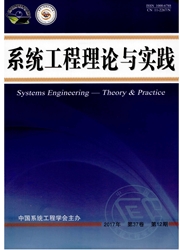

 中文摘要:
中文摘要:
针对政府对碳排放征税及消费者对低碳产品存在偏好,分别研究了随机需求下批发价契约及收益共享契约下生产商的碳减排决策问题,并比较了减排前后两种契约的最优参数.研究表明,收益共享契约能够协调不减排/减排下的供应链,并改进链上成员的收益;并且在两种契约下:都分别存在唯一的减排率使生产商/供应链整体收益最大,并且对批发价契约下生产商和零售商,及收益共享契约供应链整体,都分别存在一个使他们能从减排中获益的减排率上限.减排后,最优批发价的升降取决于生产成本的增加量,共享比例取值范围的变化取决于供应链的效率,且当消费者愿意为低碳产品多支付的价格比例高于单位生产成本的上升比例时,共享系数取值范围下降,反之,则匕升.
 英文摘要:
英文摘要:
We investigate the impact of carbon tax and the consumers' environmental awareness on the manufacturer's optimal emission reducing level and the optimal contractual parameters in a supply chain, which consists of both a retailer who faces uncertain demand and a manufacturer who exerts costly effort to reduce the carbon emission of a product during manufacturing to increase its retail price under a wholesale price contract (WPC) and a revenue-sharing contract (RSC). We show that the RSC can coordinate the supply chain with and without emission reduction and improve the two players' profits. Moreover, there exists a unique optimal reducing level for the manufacturer under WPC and for the supply chain coordi- nated with RSC, respectively, and a unique threshold of reducing level for the manufacturer and the retailer under WPC, and the supply chain coordinated with RSC to benefit from emission reduction, respectively. Furthermore, the variation of optimal wholesale price with reduction depends on the incremental unit cost of production, and the variation of the range of sharing proportion that can achieve Pareto improvement and coordinate the supply chain depends on the efficiency of the supply chain. The variation narrows when the increasing rate of the price that the consumers than that of the unit production cost, otherwise it are willing to pay for environmental products is greater broadens.
 同期刊论文项目
同期刊论文项目
 同项目期刊论文
同项目期刊论文
 期刊信息
期刊信息
